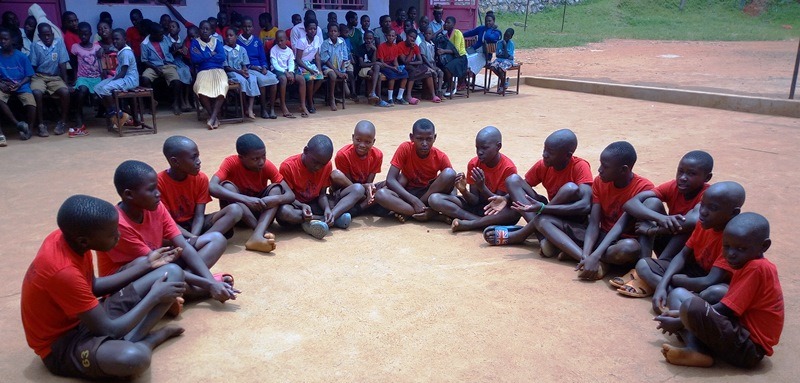In 2019, CRO continued to strengthen its programs and activities. Notably, our community outreach program has continued grow especially the SHG approach. We have been able to advocate for the rights of children both at the community level and the district. Networking and collaboration with other like-minded NGOs and CSOs was at the forefront of the agenda.
The year had several challenges as CRO especially the demise of Ms. Christine Kamiti who had spearheaded the organization for 27years. We remain conscious of remaining needs-based and are thus constantly guided by the specific needs of the street children and the community.
However,we have recorded a tangible positive difference in the lives of the street children working and staying on the streets and those in formal school particularly evident in their level of motivation, their creativity and their commitment.
|
Some of the highlights of activities in 2019 are as below; |
||
|
STREET OUTREACHES |
||
|
CRO provided them with psychosocial support and encouraged them to make important decisions to leave the streets and reintegrate in families. |
||
|
REHABILITATION |
||
|
Our emphasis was on helping these children in numeracy, literacy, life skills and behavior change. 127 children successfully completed catch up classes which prepares them to join formal education or informal Vocational Training. |
||
|
PSYCHOSOCIAL CARE AND SUPPORT |
||
|
Quite a number of children were able to interact freely with their peers and teachers, gave up the bad habits of sniffing fuels and use of other toxications and being more respectful to other people around them. |
||
|
FORMAL EDUCATION |
||
|
It’s also noteworthy, that through the provision of the school requirements, children have been able to stay in schools and concentrate on their academics other than coming back to the streets. 18 children (10 boys and 8 girls) sat for their primary leaving examinations and all qualified to join secondary schools. Immeasurable thanks to our donors who have been able to see us through. |
||
|
We hope that all of those that sat for National exams will advance to the next level of their education. The other students also perfomed quite well and all past to join the next class come 2020. |
||
|
In 2019 alone, 7 youths (4 male, 3 female) successfully graduated with bachelor’s degrees in different disciplines. 2 male students graduated with bachelors of education, 1 male graduated with bachelors in information technology and the other graduated with a bachelor’s degree in social work and social administration. The 3 females graduated with a Bachelors in social work and social administration.. We are indebted to our partners CROSO and other sundry sponsors for enabling this achievement. |
||
|
HEALTH CARE |
||
|
CRO provided medical support to street children and also their caregivers. Among the services provided included emergency care, sensitization, medical check-ups, dressing of wounds, immunization, deworming, treatment of minor illnesses, referrals for major illnesses and follow ups were provided at the centres. In the year 2019, the clinics handled a total of 12,718 cases (7,705 males, 5,013 female) of which 106 were Ante-natal care cases while 209 were complex cases that were referred to Mbale Regional, Masaka, Jinja and Lira Referral Hospitals for further management. A total of 788 children got immunized (495 boys, 293 girls), while 806 attended health talks. . |
||
|
NUTRITION |
||
|
A daily average of 580 (377 boys and 203 girls) children accessed meals. The meals were provided to promote children’s right to food and to prevent them from engaging in dubious activities in pursuit for something to eat. The provision of meals was useful in keeping children fueled, energetic and nourished. Meals also increase children’s concentration span hence contributing to their stability and retention on the program. Above and beyond, meals contributed to children’s physical and mental growth and development. |
||
|
RECREATION ACTIVITIES |
||
|
Also, games play a big role in preparing children to face challenges, increase their determination and quicken their recovery from traumatic experiences. As a result, 804 (513 boys and 291girls) children participated and their social skills, physical skills and problem-solving skills are greatly improved. recreation activities helped children to stay at the centre and participate in other programs which worked simultaneously in favor of their rehabilitation and transformation |
||
|
VOCATIONAL TRAINING |
||
|
The 4 projects of Mbale, Jinja, Masaka and Lira were able to place 133 youths (66 females, 67males) in vocational training after having been given career guidance by their individual counselors on which of the trades would be more appropriate for each of them. Trades mainly; mechanics, tailoring metal fabric and hairdressing. Their training fee and training materials/equipment were provided to facilitate their practice. The training takes between 6 months and one year and in December 2019, each youth/child was provided with start-up tool kits to begin work. IVT is aimed at giving gainful and meaningful employment to these children/youths. Gaining skills has raised their confidence and uplifted their social status. |
||
|
RE-INTEGRATION IN FAMILIES |
||
|
|
||
|
COMMUNITY OUTREACHES |
||
|
This concept has enabled members to do weekly savings,deal with issues concerning child protection, postive parenting, family welfare, hygiene and sanitation. As a result, our members in the communities have been able to develope apositive household relationship due to the mutual understanding between husbands, wives and the children as well as financial stability. |
||
|
AGRICULTURE |
||
|
CRO had a good harvest of maize, beans, potatoes and vegetables in the year. This greatly helped to supplement on the food budget.A number of goats for income generation are also kept on the farm in Mbale. |
||
|
Finally, we thank you very much for all your support throughout the year to ensure that former Street children enjoy their right to education, health, food and shelter. It is through education that they can unleash their potential to improve their lives and become productive persons in society. |
||
|
Compiled by; |
||
|
National Office |
|
|



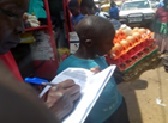 CRO was able to reach out to 1,156 (253 girls and 903 boys) children on the streets of Mbale, Lira, Masaka and Jinja by the help of our committed social workers and volunteers.
CRO was able to reach out to 1,156 (253 girls and 903 boys) children on the streets of Mbale, Lira, Masaka and Jinja by the help of our committed social workers and volunteers.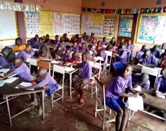 CRO was able to rehabilitate 320 children (198 boys, 122 girls). Mbale had 130 (80 boys and 50 girls) children, Masaka 50 (29 boys and 21 girls), Jinja 60 (42 boys and 18 girls), and Lira 80 (47 boys and 33 girls. The numbers reduced slightly due to limited funding.
CRO was able to rehabilitate 320 children (198 boys, 122 girls). Mbale had 130 (80 boys and 50 girls) children, Masaka 50 (29 boys and 21 girls), Jinja 60 (42 boys and 18 girls), and Lira 80 (47 boys and 33 girls. The numbers reduced slightly due to limited funding.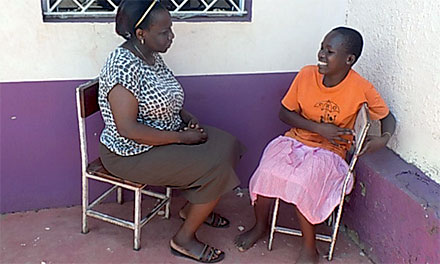 In the year , we were able to offer psychosocial support through our social workers to 1,384 (560 girls and 724 boys) in 16,608 counseling sessions across all the 4 CRO centres. At the end of the day, children were able to adjust positively, regain hope, develop self-esteem and improve their social life.
In the year , we were able to offer psychosocial support through our social workers to 1,384 (560 girls and 724 boys) in 16,608 counseling sessions across all the 4 CRO centres. At the end of the day, children were able to adjust positively, regain hope, develop self-esteem and improve their social life.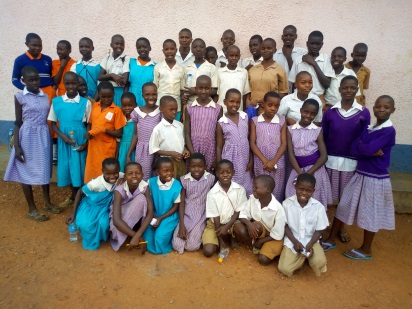 Primary Education: In 2019 CRO was able to support 677 (416 boys, 261 girls) children in primary level education. The children were supported with school fees and scholastic materials to facilitate their learning. CRO ensured that all the stake holders play their part in supporting children with a conducive environment both while at school and homes.
Primary Education: In 2019 CRO was able to support 677 (416 boys, 261 girls) children in primary level education. The children were supported with school fees and scholastic materials to facilitate their learning. CRO ensured that all the stake holders play their part in supporting children with a conducive environment both while at school and homes.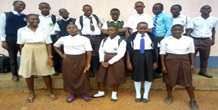 Secondary Education: 90 (54 boys, 36 girls) were supported with school fees in secondary schools. 10 (5 girls, 5 boys) children/youths were able to complete their (S.4) Ordinary Level Certificate and 1 youth completed Uganda Advanced Certificate of Education examinations.
Secondary Education: 90 (54 boys, 36 girls) were supported with school fees in secondary schools. 10 (5 girls, 5 boys) children/youths were able to complete their (S.4) Ordinary Level Certificate and 1 youth completed Uganda Advanced Certificate of Education examinations.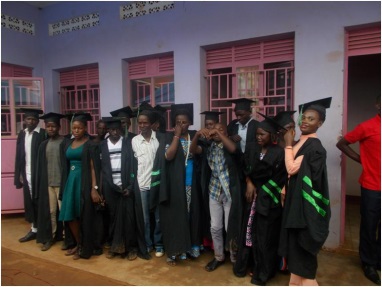 Tertiary Education: CRO is grateful that in 2019, 27 youths (18 male, 9 female) were supported to pursue different courses invarious tertiary institutions.
Tertiary Education: CRO is grateful that in 2019, 27 youths (18 male, 9 female) were supported to pursue different courses invarious tertiary institutions.
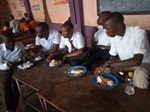 For 5 days a week, CRO provides nutritious Breakfast and Lunch to all children who came to the centre comprising of foods like; maize flour, beans, rice, meat, rice, green vegetables and fruits.
For 5 days a week, CRO provides nutritious Breakfast and Lunch to all children who came to the centre comprising of foods like; maize flour, beans, rice, meat, rice, green vegetables and fruits.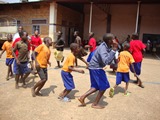 Recreation activities were organized to promote children’s right to play, strengthen social bonds, teach creativity, teaching loyalty, teaching rules and provide fun.
Recreation activities were organized to promote children’s right to play, strengthen social bonds, teach creativity, teaching loyalty, teaching rules and provide fun.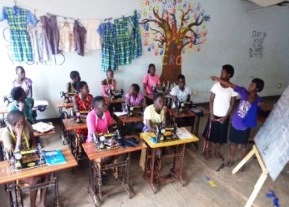
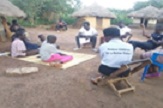 361 children (224 boys and 137 girls) were re-ihtegrated into family-based care hence protecting them from violence, abuse and exploitation associated with street life. Reintegration also provides an opportunity for the children who had left school to re-join and to realize their fundamental right to education alongside other rights and privileges that are enjoyed in family care such as love, care, belonging, food, shelter, proper clothing, clean environment, medical care and others.
361 children (224 boys and 137 girls) were re-ihtegrated into family-based care hence protecting them from violence, abuse and exploitation associated with street life. Reintegration also provides an opportunity for the children who had left school to re-join and to realize their fundamental right to education alongside other rights and privileges that are enjoyed in family care such as love, care, belonging, food, shelter, proper clothing, clean environment, medical care and others.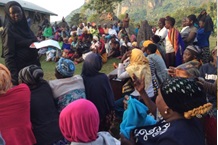 Our Self Help Groups (SHGs) formation reached 55 groups with membership of 1,100 community members who happen to be only women. Through out the year, the groups were empowered with knowledge and skills on the Self Help Group concept.
Our Self Help Groups (SHGs) formation reached 55 groups with membership of 1,100 community members who happen to be only women. Through out the year, the groups were empowered with knowledge and skills on the Self Help Group concept.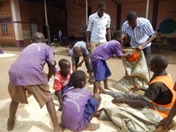 CRO has farm land in Mbale and Jinja where children go and participate in the growing of their own food. In addition to producing their own food, children also learn farming skills to help them generate their own food and cash crops at their homes.
CRO has farm land in Mbale and Jinja where children go and participate in the growing of their own food. In addition to producing their own food, children also learn farming skills to help them generate their own food and cash crops at their homes.